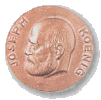A brief definition:
'Food chemistry is the science of the properties and transformations of our food and its components.'
However, food chemistry does not only deal with food but also with feed, cosmetics and other commodities such as food packages, dinner services, cleaning and washing things, clothing and laundry, toys, and even tobacco and tobacco products.
In Germany, food chemistry is its own profession and the study is not integrated into Food Science as in other anglo-american countries. The title of food chemist is protected by law for those scientists who have passed a specified course load. It calls for 4.5 years of uiversity study and 1 year of professional training. The qualification, contents of study and exams are under supervision of state authorities.
 The foundation of 'Food Chemistry' as a defined subject in natural sciences was made about 120 years ago and is strongly connected with the life-work of Josef König (1843-1930), the former director of the agricultural research centre in Münster. In 1878 he published his handbook of 'Chemistry of Human Food and Commodities'. The first handbook edition consisted of two volumes, whereas the fourth edition was comprised of five volumes, which summarized the knowledge of food chemistry available at that time.
The foundation of 'Food Chemistry' as a defined subject in natural sciences was made about 120 years ago and is strongly connected with the life-work of Josef König (1843-1930), the former director of the agricultural research centre in Münster. In 1878 he published his handbook of 'Chemistry of Human Food and Commodities'. The first handbook edition consisted of two volumes, whereas the fourth edition was comprised of five volumes, which summarized the knowledge of food chemistry available at that time.
It is said that König's interest in food chemistry started with the following anecdote: On the occasion of a banquet, König was asked by his neighbour at table if asparagus had a special nutritional value. König did not know the answer. Immediately he started studying scientific literature but could not find an answer in any published work available to him at the time. Fortunately, he overlooked one publication and started his own research on the composition of asparagus. He then expanded his research onto other foods step by step and this is how he became a pioneer of modern food chemistry.
At the time of Josef König, food chemist became a real profession.
Published in 1879, the first 'national' food law laid down the chemical-technical investigation and the assessment of food and commodities. An occupational group having the specific analytical knowledge was commissioned for law controls. In 1894, education and training of the occupational group was laid down by German law in a standardized routine of teaching and examination, which had been valid until the 1970s. Based on the German law of 1879 and the order of education and examination of 1894, modern consumer protection was developed, which is the maxim of the subject food chemistry.
In spite of the rapid developments in the fields of processing and production of food - including food adulterations - it was necessary to improve the national food law in the beginning of the 20th century. Interrupted by World War I, this finally succeeded in 1927 with the publication of the new food law, the so-called 'Lebensmittelgesetz' (LMG). The LMG adapted in sophisticated form the new situation on the food market. Along with the LMG, today's job title 'Lebensmittelchemiker' (food chemist) was introduced.
In 1976, another total reform of the food law came along in the form of the 'Lebensmittel- und Bedarfsgegenständegesetz' (LMBG), which in principle is still valid today. However, with the goal of a common European food law, regular influences take place on the content of the LMBG.
The new Food and Feed Law Book (LFGB) was established in 2005. It summarizes endeavour and success on harmonization in the European Community.
Due to governmental regulation, the studies of food chemistry are finished to date with the so-called state examination for food chemists. Only recently, some universities established diplomas in parallel to the state exam, and also bachelor/master programmes.
- Technische Universität Berlin
Institut für Lebensmitteltechnologie und Lebensmittelchemie
- Universität Bonn
Institut für Ernährungs- und Lebensmittelwissenschaften
- Technische Universität Braunschweig
Institut für Lebensmittelchemie
- Technische Universität Dresden
Fakultät für Chemie und Lebensmittelchemie
- Universität Erlangen-Nürnberg
Department Chemie und Pharmazie
Lehrstuhl für Lebensmittelchemie
- Universität Gießen
Institut für Lebensmittelchemie und Lebensmittelbiotechnologie
- Universität Halle-Wittenberg
Institut für Chemie
Bereich Lebensmittel und Umweltchemie
- Universität Hamburg
Hamburger School of Food Science (HSFS) -
Institut für Lebensmittelchemie
- Universität Hannover
Institut für Lebensmittelchemie (LCI)
- Universität Hohenheim
Institut für Lebensmittelchemie
- Technische Universität Kaiserslautern
Fachbereich Chemie
Fachrichtung Lebensmittelchemie und Umwelttoxikologie
- Karlsruher Institut für Techologie (KIT)
Institut für Angewandte Biowissenschaften
Abteilung für Lebensmittelchemie und Toxikologie
- Technische Universität München
Lehrstuhl für Lebensmittelchemie und Molekulare Sensorik
Lehrstuhl für Analytische Lebensmittelchemie
- Universität Münster
Institut für Lebensmittelchemie
- Universität Potsdam
Lehrstuhl für Lebensmittelchemie
- Universität Stuttgart
Institut für Biochemie und Technische Biochemie
Abteilung Lebensmittelchemie
- Universität Würzburg
Institut für Pharmazie und Lebensmittelchemie
Lehrstuhl für Lebensmittelchemie
- Universität Wuppertal
Fakultät für Mathematik und Naturwissenschaften
Chemie und Biologie
Lehrstuhl für Lebensmittelchemie
Please click here to continue.
LebensmittelchemikerInnen arbeiten bei staatlichen Behörden und Ämtern, in analytischen Laboratorien in Handel, Technik und Industrie, an Universitäten und als Selbständige. Das Spektrum von Tätigkeitsfeldern reicht von der Lebensmittel-, Kosmetika-, Genussmittel- und Bedarfsgegenstandskontrolle, -entwicklung und -forschung bis zu vielfältigen Aufgaben im Umweltschutz.
Beispiele der Tätigkeitsbereiche zeigt die nachfolgende Aufstellung.
| im öffentlichen Dienst | in der freien Wirtschaft |
|---|---|
|
|


